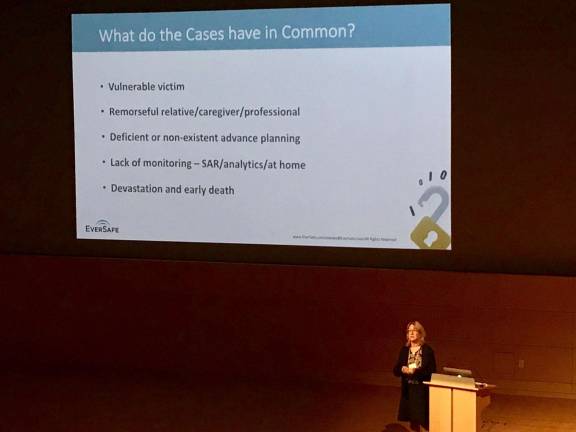preventing elder abuse

While some people say they’ve always loved children, Liz Lowey says that for her, it’s always been older people. When she was 12, she and her mother would serve Meals on Wheels to the seniors in her town — and from there, her interest in the elderly community grew.
So it was fitting that Lowey, former chief of the Manhattan DA’s Elder Abuse Unit, found herself giving the keynote address at the Jewish Association Serving the Aging’s 12th Annual Elder Abuse Conference at the New School on June 14.
Elder abuse often goes underreported; the New York State Elder Abuse Prevalence Study indicates that out of 24 cases, only one victim of elder abuse will come forward. The reasons seniors keep their abuse under wraps varies, but most often, it boils down to shame and guilt — nearly 58 percent of the time, the senior is abused by a family member, leaving the victim less likely to report the abuse.
Workshops at the conference highlighted six types of elder abuse: physical, psychological, sexual, financial, neglect and abandonment. These forms of abuse typically overlap, and JASA’s Manhattan District Director Martha Pollack finds there is almost always a psychological component to any abusive case. “A lot of our clients suffer from depression, anxiety and post-traumatic stress disorder because of this abuse,” she said.
Signs of elder abuse include unexplained bruises and physical injuries; noticeable changes in daily patterns; unkempt appearance, poor hygiene and being inappropriately dressed for the weather; increased social isolation; and the sudden inability to pay bills.
JASA, a non-profit agency dedicated to serving older adults across New York’s boroughs, has been providing services for seniors since their founding in 1968, and has created programs such as the Legal/Social Work Elder Abuse Program, to help individuals affected by abuse free of charge.
The conference was conceived 12 years ago to further JASA’s dedication to serving seniors by educating those who work with them. “We realized we had this very special knowledge and expertise at the time that wasn’t really on anyone’s radar in New York City,” said JASA’s Attorney-in-Charge Donna Dougherty. “We had such a big turnout that we realized there was a thirst for this information. People were really grappling with the issues and didn’t know where to go.”
The focus of this year’s conference was on planning and prevention, which Lowey’s keynote addressed.
Lowey has worked with victims of elder fraud for much of her career. In the Manhattan DA’s office, she oversaw the investigation and prosecution of approximately 800 elder abuse cases annually, including the prosecution of Brooke Astor’s son Anthony Marshall. Lowey now serves as General Counsel at EverSafe, a technology company focused on preventing elder fraud and identity theft.
“Everyone loves to talk about what we should do after we believe that someone’s been victimized,” Lowey said. “That’s really important, but the truth is, I think that most of these cases would be resolved if people would just be more proactive before there’s a crisis.”
According to the National Counseling on Aging, elder financial fraud costs older Americans $36.5 billion per year; because of their age, seniors are more vulnerable to fall victim to a myriad of scams and are less likely to report them.
Scams that target the elderly include tech support scams, IRS scams and mortgage refinancing scams. Of the more creative scams is the “stranded grandchild scam:” a younger person claiming to be the senior’s grandchild calls to ask for money after doing something reckless and begs the senior not to tell his or her parents.
According to the Associated Living Federation of America, financial exploitation is the most common form of elder abuse; Lowey believes the best way to combat fraud is through the utilization of new technology, which she addressed in her presentation.
She mentioned companies like NomoRobo, a free service that prevents telemarketers from calling; Mojio, which tracks driving habits and can identify changes in driving behavior; and EverSafe.
Marleny Garcia, a conference attendee who works with seniors at the Neighborhood SHOPP in the Bronx, was particularly interested to learn about elder fraud. But the most common form of abuse she’s encountered is verbal abuse. “I’ve found that it’s most often family members,” Garcia said.
Abuse occurs among family members and other caregivers for many reasons. The inability to cope with stress; depression; lack of support from other potential caregivers; and the decline in the elder person’s physical and mental health are all potential stressors that could turn a caregiver into an abuser.
Elder abuse can be avoided; that much the conference proved. But if an elder has already become a victim, the situation must be reported. Call 911 if the senior is in immediate physical danger; otherwise, use 311 to report the elder abuse. You can also get direct help from local community organizations, like JASA and the NYC Elder Abuse Center.